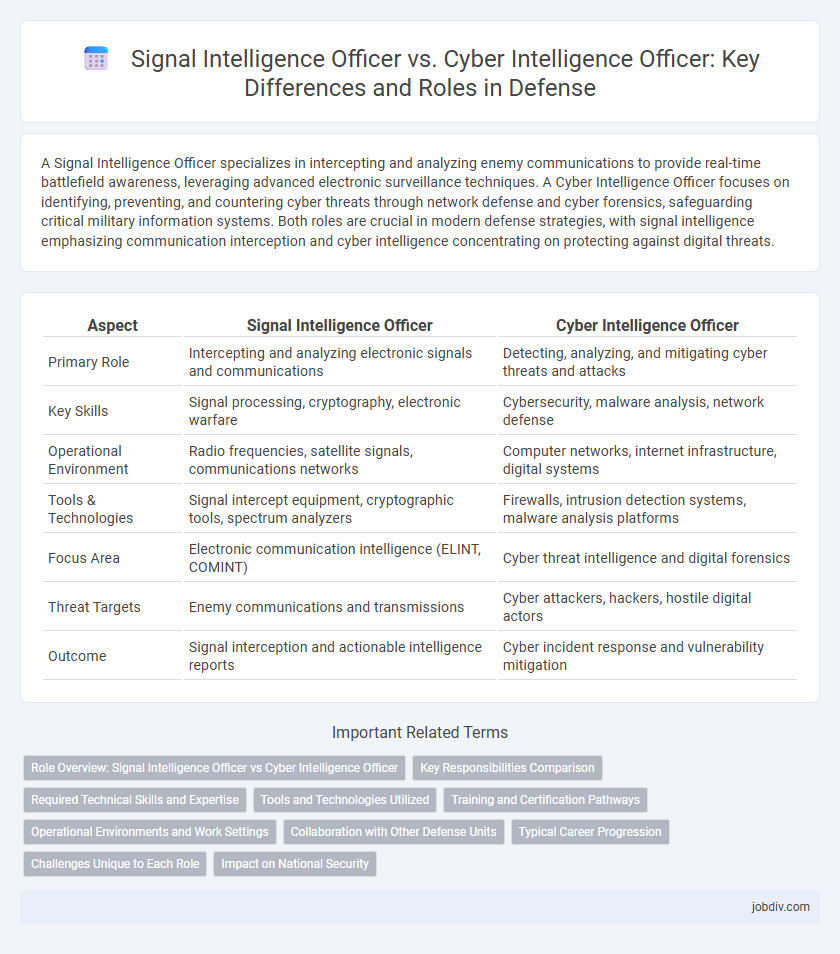A Signal Intelligence Officer specializes in intercepting and analyzing enemy communications to provide real-time battlefield awareness, leveraging advanced electronic surveillance techniques. A Cyber Intelligence Officer focuses on identifying, preventing, and countering cyber threats through network defense and cyber forensics, safeguarding critical military information systems. Both roles are crucial in modern defense strategies, with signal intelligence emphasizing communication interception and cyber intelligence concentrating on protecting against digital threats.
Table of Comparison
| Aspect | Signal Intelligence Officer | Cyber Intelligence Officer |
|---|---|---|
| Primary Role | Intercepting and analyzing electronic signals and communications | Detecting, analyzing, and mitigating cyber threats and attacks |
| Key Skills | Signal processing, cryptography, electronic warfare | Cybersecurity, malware analysis, network defense |
| Operational Environment | Radio frequencies, satellite signals, communications networks | Computer networks, internet infrastructure, digital systems |
| Tools & Technologies | Signal intercept equipment, cryptographic tools, spectrum analyzers | Firewalls, intrusion detection systems, malware analysis platforms |
| Focus Area | Electronic communication intelligence (ELINT, COMINT) | Cyber threat intelligence and digital forensics |
| Threat Targets | Enemy communications and transmissions | Cyber attackers, hackers, hostile digital actors |
| Outcome | Signal interception and actionable intelligence reports | Cyber incident response and vulnerability mitigation |
Role Overview: Signal Intelligence Officer vs Cyber Intelligence Officer
Signal Intelligence Officers specialize in intercepting, analyzing, and exploiting electronic signals to gather actionable intelligence on enemy communications and radar emissions. Cyber Intelligence Officers concentrate on identifying, assessing, and defending against cyber threats by monitoring network vulnerabilities, cyber attack patterns, and digital espionage activities. Both roles are crucial for national security, with Signal Intelligence focusing on traditional electronic warfare and Cyber Intelligence emphasizing the digital domain.
Key Responsibilities Comparison
Signal Intelligence Officers specialize in intercepting, analyzing, and exploiting electronic communications to gather actionable battlefield information, focusing on signals interception and electronic warfare. Cyber Intelligence Officers concentrate on identifying, preventing, and countering cyber threats through network defense, malware analysis, and cyber forensics to protect critical defense infrastructure. Both roles require advanced knowledge of intelligence collection, but Signal Intelligence emphasizes radio frequency and signal exploitation, while Cyber Intelligence centers on cyberspace operations and digital threat mitigation.
Required Technical Skills and Expertise
Signal Intelligence Officers require proficiency in electronic signals interception, radio frequency analysis, and cryptographic techniques to effectively gather and interpret communication data. Cyber Intelligence Officers specialize in cybersecurity, network intrusion detection, malware analysis, and digital forensics to protect and analyze cyber environments. Both roles demand strong analytical skills, but Signal Intelligence focuses on real-time signal monitoring while Cyber Intelligence emphasizes defending and exploiting digital infrastructure.
Tools and Technologies Utilized
Signal Intelligence Officers primarily utilize advanced radio frequency interception systems, spectrum analyzers, and electronic warfare tools to detect, intercept, and analyze enemy communications. Cyber Intelligence Officers leverage sophisticated cybersecurity platforms, malware analysis tools, intrusion detection systems, and AI-driven threat intelligence frameworks to monitor, defend, and respond to cyber threats in digital networks. Both roles demand expertise in intelligence analysis software but differ significantly in their operational environments and technological focus areas.
Training and Certification Pathways
Signal Intelligence Officers undergo rigorous training in electronic warfare, cryptography, and RF spectrum analysis, often receiving certifications such as Certified Information Systems Security Professional (CISSP) and specialized military signals intelligence qualifications. Cyber Intelligence Officers require advanced knowledge in network security, threat analysis, and cyber forensics, with certifications including Certified Ethical Hacker (CEH), GIAC Cyber Threat Intelligence (GCTI), and courses aligned with the Cybersecurity and Infrastructure Security Agency (CISA) standards. Both roles demand continuous education, but Signal Intelligence training emphasizes hardware and signal interception techniques, whereas Cyber Intelligence focuses on digital threat mitigation and cyber defense strategies.
Operational Environments and Work Settings
Signal Intelligence Officers operate primarily in communication-centric environments, utilizing intercept and analysis of electronic signals to gather actionable intelligence in battlefield and strategic contexts. Cyber Intelligence Officers focus on digital domains, working within network defense and offensive cyber operations to identify threats and vulnerabilities in virtual environments such as computer networks and information systems. Both roles demand adaptability to dynamic, high-pressure settings, but Signal Intelligence often emphasizes physical signal intercept stations, while Cyber Intelligence is rooted in secure cyber command centers.
Collaboration with Other Defense Units
Signal Intelligence Officers collaborate closely with electronic warfare units and communications specialists to intercept and analyze enemy transmissions, enhancing battlefield awareness. Cyber Intelligence Officers coordinate with cyber defense teams and network operations centers to identify and counteract cyber threats targeting military infrastructure. Both roles share critical intelligence through integrated defense networks, ensuring real-time situational knowledge and strategic decision-making across multiple defense domains.
Typical Career Progression
Signal Intelligence Officers typically begin their careers as analysts or linguists interpreting intercepted communications before advancing to supervisory roles managing technical collection and processing teams. Cyber Intelligence Officers often start as cybersecurity analysts or network specialists, progressing to positions overseeing threat analysis, cyber operations, and digital forensics. Both career paths demand continuous technical skills development, leadership training, and strategic mission planning experience to reach senior intelligence or command positions.
Challenges Unique to Each Role
Signal Intelligence Officers face challenges related to intercepting and decrypting complex communication signals in contested electromagnetic environments, requiring expertise in radio frequency technologies and signal processing. Cyber Intelligence Officers confront distinct challenges including combating sophisticated cyber threats, analyzing malware, and securing digital networks against infiltration, demanding proficiency in cybersecurity tools and threat intelligence frameworks. Both roles necessitate continuous adaptation to evolving technological advancements and adversarial tactics within the defense sector.
Impact on National Security
A Signal Intelligence Officer specializes in intercepting and analyzing electronic communications, providing critical real-time intelligence that enhances battlefield awareness and counters enemy operations. A Cyber Intelligence Officer focuses on identifying and mitigating cyber threats, protecting national infrastructure from cyberattacks, and securing sensitive government networks. Both roles are pivotal in safeguarding national security by ensuring information superiority and resilience against asymmetric and cyber threats.
Signal Intelligence Officer vs Cyber Intelligence Officer Infographic

 jobdiv.com
jobdiv.com